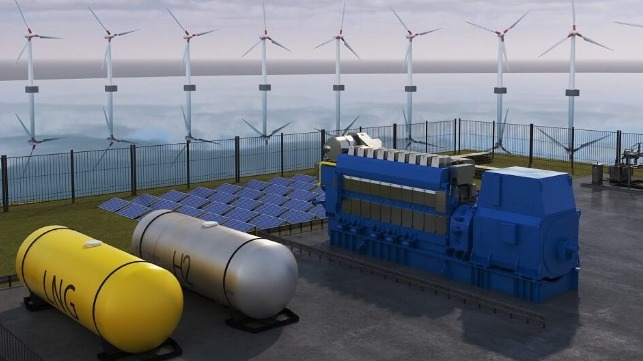Bergen Engines Runs Standard Natural-Gas Powerplant on Hydrogen Blend

Norwegian manufacturer Bergen Engines has successfully tested out one of its natural-gas powerplants on a blend of gas and hydrogen, without making any changes.
In the recent test, Bergen's engineers fed one of the company's common B Series engines a blend of 15 percent hydrogen / 85 percent natural gas, without any hardware adjustments. They confirmed that it maintained rated power output at all load levels, and carbon dioxide, carbon monoxide and methane slip emissions were all reduced. It is a significant step in a long-running R&D program that will examine requirements to run on hydrogen at higher mix ratios.
"Several of our customers are already interested in mixing hydrogen into natural gas," says Jon Erik Røv, Managing Director of Bergen Engines. "During [2022] we expect to have sufficient knowledge of changes that need to be made to the engine in order to run on a hydrogen mix. The ambition is to create a commercial upgrade solution which allows up to 60 percent hydrogen."
Bergen's expectation is that the engine upgrade for higher levels of hydrogen mixtures can done as part of a maintenance overhaul that includes piston replacement. This teardown would already occur in the ordinary course of operations, so the extra cost of the upgrade would be reduced.

that matters most
Get the latest maritime news delivered to your inbox daily.
Bergen Engines has recently been acquired by UK-based private industrial conglomerate Langley Holdings. The previous owner, Rolls-Royce, acquired Bergen in a merger in 1999 and decided to divest it as part of a large-scale reorganization effort in 2020. In February 2021, Rolls-Royce announced an agreement to sell Bergen Engines to Russian railroad company Transmashholding International for about $180 million. The Norwegian government blocked the sale on national security grounds, since Norway is a NATO member and many of its warships run on Bergen powerplants.
In August, Langley Holdings announced that it had agreed to purchase Bergen from Rolls-Royce for a lower price of about $100 million ($120 million when including a cash transfer out of Bergen). The deal was finalized in December. Among its first management decisions, Langley has green-lighted a three year study into the use of ammonia as an alternative fuel, with financial support from the Norwegian government.
